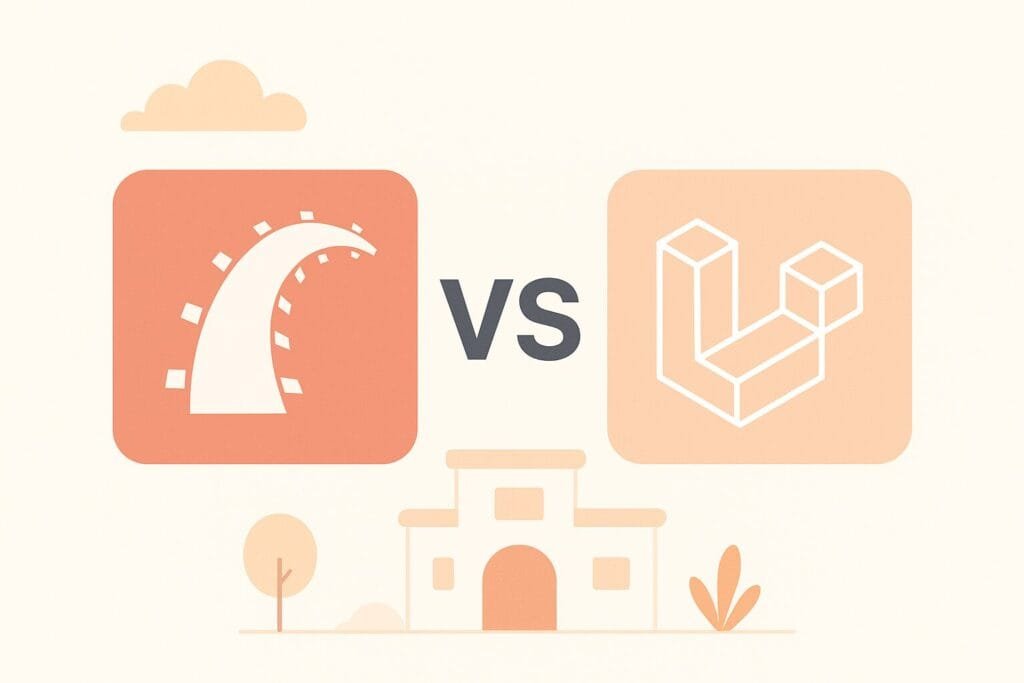When launching a startup, choosing the right web development framework can make or break your product’s success. Both Ruby on Rails and Laravel are powerful, developer-friendly frameworks used by startups and established companies worldwide. But which one is best for your business idea? In this article, we’ll compare Ruby on Rails vs Laravel in terms of performance, scalability, ease of use, cost, and ecosystem — helping you make the best decision for your startup journey.

What is Ruby on Rails?
Ruby on Rails (RoR) is an open-source web framework written in the Ruby programming language. It was introduced in 2004 and quickly became famous for its “Convention over Configuration” philosophy, which allows developers to build applications faster and with less code. Rails powers popular platforms such as GitHub, Shopify, and Airbnb.
What is Laravel?
Laravel is a modern, open-source PHP framework created by Taylor Otwell in 2011. It follows the MVC (Model-View-Controller) architectural pattern and emphasizes simplicity, elegant syntax, and developer productivity. Laravel powers thousands of web applications, including startups and enterprise platforms that require speed, flexibility, and scalability.
Ruby on Rails vs Laravel: Quick Comparison
| Feature | Ruby on Rails | Laravel |
|---|---|---|
| Language | Ruby | PHP |
| Performance | Fast, optimized for large-scale apps | Moderate, but improving with PHP 8+ |
| Learning Curve | Medium – requires learning Ruby | Easy – PHP is widely known |
| Community Support | Strong, with long-term contributors | Massive, active PHP community |
| Built-in Tools | Powerful ORM (ActiveRecord), strong testing tools | Blade templating, Artisan CLI, and Eloquent ORM |
| Scalability | Excellent for high-traffic platforms | Good, but may require optimization |
| Hosting Availability | Limited to Ruby-friendly environments | Wide availability, PHP supported almost everywhere |
| Development Speed | Rapid due to convention-based design | Fast thanks to built-in tools and packages |
| Best For | Startups needing fast MVP and scalability | Startups seeking cost-effective development |
1. Development Speed and Productivity
Both frameworks are designed to make developers more productive. Ruby on Rails shines with its convention-over-configuration philosophy, which allows teams to launch a minimum viable product (MVP) in weeks instead of months. Laravel, on the other hand, comes with tools like Artisan CLI and Laravel Forge that simplify deployment and task automation. If your startup’s main goal is to get a working prototype quickly, both are excellent — but Rails offers slightly faster iteration speed for complex apps.
2. Learning Curve and Developer Availability
Laravel has the advantage here because PHP is one of the most popular languages in the world. Many developers are already familiar with it, making hiring easier and cheaper. Ruby on Rails, while elegant, has a smaller developer pool — which may increase costs for recruitment and long-term maintenance.
3. Performance and Scalability
Rails is known for handling complex, high-traffic applications efficiently. Its ecosystem supports background jobs, caching, and asynchronous processing — essential features for scaling. Laravel’s performance has improved drastically with the release of PHP 8 and 8.2, offering JIT compilation and faster response times. For startups expecting heavy traffic or data processing, Ruby on Rails might be more future-proof.
4. Cost and Hosting Options
Since Laravel runs on PHP, hosting options are more affordable and abundant. Ruby on Rails, however, often requires specialized hosting environments such as Heroku or AWS, which might be slightly more expensive. From a budget standpoint, Laravel offers a lower entry barrier for startups.
5. Ecosystem and Community Support
Both frameworks have robust ecosystems. Rails has a mature community with thousands of gems (libraries) that simplify integration. Laravel’s ecosystem is modern and rapidly evolving, featuring tools like Laravel Nova for admin panels and Laravel Vapor for serverless deployment. In terms of learning resources and tutorials, Laravel’s documentation is often praised as one of the best in the PHP world.
6. Security
Security is vital for startups, and both frameworks offer strong protection against common threats like SQL injection, CSRF, and XSS. Rails has a longer history of handling large-scale security challenges due to its enterprise-level use cases. Laravel’s built-in authentication and encryption features also make it a solid choice for startups dealing with user data.
7. Use Cases
- Choose Ruby on Rails if you’re building a complex platform that needs rapid scaling, such as SaaS products, social networks, or marketplaces.
- Choose Laravel if you’re building an e-commerce site, CMS, or business application with a limited budget and need fast deployment.
Conclusion: Which Framework is Best for Startups?
Both Ruby on Rails and Laravel are excellent frameworks for startups, but the right choice depends on your goals, budget, and technical expertise. If you prioritize speed, scalability, and elegance, choose Ruby on Rails. If you prefer cost-effectiveness, simplicity, and a massive developer community, choose Laravel.
Ultimately, there’s no one-size-fits-all answer. The best framework is the one that aligns with your startup’s roadmap and your team’s strengths. Whichever you choose, both frameworks are proven tools that can take your business from idea to success.

